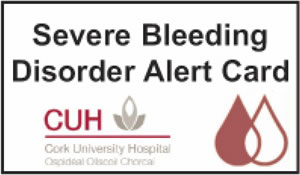Background
More at Bleeding disorder section.
Haemophilia refers to patients with bleeding disorders such as Haemophilia, Von Willebrand disease, Rare bleeding disorders and Platelet function disorders are registered with a Comprehensive Care Centre (CCC) for the treatment of these conditions.
The CCCs are in St James's Hospital and Cork University Hospital for adults (>16 years old) and in Our Lady's Children's Hospital, Crumlin and Cork University Hospital for children (<16 years old).
If you are a medical professional and require an urgent discussion with one of the haematology medical team, please contact CUH switchboard on (021) 4922000 and ask to be put through to the haematology registrar on call.
All registered patients with bleeding disorders in Ireland should have a registration card which shows their diagnosis on the front and the contact details for their CCC on the back. If a patient attends an Emergency Department for any reason, they should be asked for their registration card.

Treatment of bleeds
- Identify site of bleed and assess clinically
- All bleeds or suspected bleeds must be treated immediately prior to any other investigations
- Check medical records and with patient for type of factor deficiency
- Treatment should be led by the haematology team based on the national treatment guidelines
Assessment
- Identify the site of the suspected bleed
- Assess for compression of vital structures e.g. airway, nerves or blood vessels, and manage accordingly
- Assess and treat pain
- Where possible, obtain details from the patient or relative regarding the bleeding disorder diagnosis, factor level, inhibitor status and treatment of choice
- Check if the patient is carrying their bleeding disorder registration card
- Weigh the patient (or estimate weight)
- Confirm the date, time and dose of the last factor concentrate infusion received (especially important if the patient usually takes prophylaxis)
- Undertake initial blood testing to include: FBC, Biochemistry, Group and Cross-match, PT/APTT and Factor Levels – at least 6 mls blood in citrate sample bottles (note that levels do not need to be reported in order to treat a bleed as the dose can be calculated if the date of the last CFC treatment and the registered baseline factor level are known)
- Arrange appropriate imaging but do not delay haemostatic treatment /referral if a bleed is suspected. Treat first, image after
- Contact the patient's CCC immediately following the initial assessment
- If in doubt manage as a bleed, but consider alternative diagnosis and investigate accordingly
- If patient with mild FVIII deficiency is known to be DDAVP responsive, consider DDAVP for certain bleeds
- Factor may be obtained from the blood bank in the CUH on a named patient basis
- Always round dose up or down to use the entire vial. Never discard factor
- Do not give IM injections, NSAIDs or Aspirin
- Tranexamic acid (TXA) - Cyclokapron - may be used for mucosal bleeds in conjunction with factor concentrate. TXA infusion guide
INHIBITORS:Discuss all management decisions with Consultant Haematologist on call
Recombinant activated factor VII: (Novoseven®)
- Haemarthrosis / muscle bleeds - 90µg/kg (4.5KIU/kg) every 2 hrs for 3 doses
- Major bleeds i.e. CNS and Illeopsaos bleeds - 90µg/kg (4.5KIU/kg) repeat 2 – 4hourly until bleed resolves